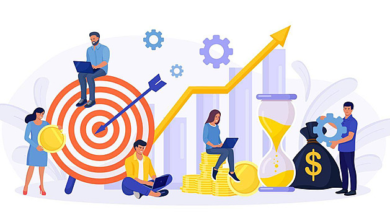Why Every B2C Company Needs an Effective SEO Strategy

In today’s competitive digital landscape, simply having a website isn’t enough. Consumers are constantly searching online for products, services, and solutions, and their choices are often influenced by what appears on the first page of search engine results. For business-to-consumer (B2C) companies, visibility in these search results can make the difference between thriving and falling behind. An effective SEO (Search Engine Optimization) strategy is no longer a nice-to-have it’s a necessity. By optimizing for search engines, B2C companies can attract qualified traffic, improve customer engagement, and achieve sustainable growth in a crowded market.
Why SEO Matters for B2C Companies?
SEO (Search Engine Optimization) is crucial for B2C (business-to-consumer) companies looking to thrive in today’s competitive online marketplace. SEO is not just about ranking higher on search engines; it’s about creating a seamless, user-friendly experience that drives relevant traffic to your website, improves visibility, and ultimately increases conversions. Below are the key reasons why SEO is essential for B2C companies:
Consumer Behavior Has Changed
Modern consumers rarely make purchasing decisions without consulting search engines first. Whether it’s comparing product reviews, checking local availability, or finding the best deal, search queries are at the heart of the buying journey. For B2C companies, appearing in these moments of intent is crucial.
Organic Traffic Drives Long-Term Results
Unlike paid advertising, which stops the moment a budget runs out, SEO builds equity. When a company ranks highly for relevant keywords, it earns organic visibility that continues to generate traffic, leads, and sales over time.
Trust and Credibility
High search rankings don’t just deliver traffic they also build trust. Customers naturally view businesses that appear near the top of results as more credible and authoritative. For B2C brands, credibility directly impacts purchase decisions.
Core Elements of an Effective SEO Strategy
An effective SEO (Search Engine Optimization) strategy is essential for driving organic traffic, improving search engine rankings, and enhancing user experience. Whether you’re a B2C company or a service provider, SEO is a critical component of your digital marketing efforts. Below are the core elements of a successful SEO strategy that can help boost your online visibility and drive sustainable traffic.
Keyword Research and Intent
The foundation of SEO lies in understanding what customers are searching for. Effective keyword research doesn’t just identify high-volume terms; it analyzes intent behind the search. Are users seeking information, comparing options, or ready to buy? Tailoring content to meet these stages ensures higher relevance and conversions.
On-Page Optimization
On-page SEO involves structuring website content in a way that both users and search engines can easily understand. This includes optimizing:
- Titles and meta descriptions.
- Header tags for logical content flow.
- Image alt texts for accessibility and relevance.
- Internal links to guide users through the site.
Technical SEO
Even the best content won’t perform if a website is technically flawed. Factors such as mobile responsiveness, site speed, structured data, and secure connections (HTTPS) are essential for delivering a seamless user experience and satisfying search engine requirements.
Content Strategy
Content is the bridge between a company and its audience. Blog posts, videos, guides, and product descriptions should answer real customer questions, highlight benefits, and provide value. High-quality content is not only favored by search engines but also drives engagement and repeat visits.
The Role of Local SEO in B2C Success
For many B2C businesses, local visibility is a game-changer. Whether it’s a restaurant, boutique, or service provider, customers often search for businesses “near me” before making a decision.
Local Listings and Maps
Optimizing Google Business Profile ensures that customers can find accurate information such as hours, location, and reviews. Appearing in local map packs can significantly increase foot traffic.
Reviews and Ratings
Customer reviews heavily influence B2C purchase decisions. Encouraging satisfied customers to leave reviews not only boosts credibility but also signals trustworthiness to search engines.
Mobile Optimization: A Non-Negotiable
The majority of B2C searches now happen on mobile devices. If a site isn’t mobile-friendly, users will leave, and rankings will suffer.
Responsive Design
Websites must adapt seamlessly to different screen sizes, ensuring easy navigation and readability.
Mobile Page Speed
Search engines prioritize sites that load quickly on mobile. Techniques such as compressing images, reducing code, and leveraging browser caching can drastically improve speed.
SEO Services for B2C Companies
Implementing SEO effectively can be complex, requiring a blend of strategy, technical expertise, and ongoing monitoring. That’s why many organizations turn to professional seo services for b2c. These services typically include:
- Comprehensive keyword analysis tailored to consumer behavior.
- Competitor audits to identify gaps and opportunities.
- Continuous optimization of on-page and technical elements.
- Creation of consumer-focused content designed to convert.
- Regular performance reporting to measure impact.
For B2C companies with limited internal expertise, such services ensure SEO efforts are both strategic and sustainable.
Using Analytics to Drive SEO Decisions
Analytics is an essential tool in any SEO strategy. By harnessing the power of analytics, businesses can make data-driven decisions that improve their search engine rankings, drive organic traffic, and enhance user experience.
Whether it’s tracking website performance, user behavior, or identifying underperforming pages, analytics provides valuable insights that can guide SEO efforts and ensure optimal results. Below are key ways to use analytics to drive SEO decisions effectively.
Tracking Performance
Analytics tools such as Google Analytics or Search Console provide insights into which keywords, pages, and channels drive the most traffic.
Conversion Metrics
Beyond traffic, it’s important to measure conversions sales, form submissions, or newsletter sign-ups. These metrics reveal whether SEO efforts are translating into tangible results.
Iteration and Improvement
SEO is not static. By regularly analyzing performance data, companies can refine strategies, test new approaches, and adapt to changing algorithms or consumer behaviors.
The Content Advantage
Content is often considered the cornerstone of a successful SEO strategy. High-quality, relevant content not only helps improve search engine rankings but also plays a crucial role in engaging and converting website visitors. Content is a powerful tool that can build trust, authority, and drive traffic, making it a key differentiator for B2C companies. Here’s how leveraging the content advantage can significantly impact SEO and user engagement:
Blogging for Authority
Publishing regular blog content allows businesses to answer common consumer questions, demonstrate expertise, and target long-tail keywords that drive niche traffic.
Visual Content and Engagement
Videos, infographics, and interactive tools enhance user experience while increasing time spent on site factors that positively influence rankings.
Evergreen vs. Seasonal Content
A balanced mix of evergreen content (always relevant) and seasonal content (tied to trends or holidays) ensures steady traffic while capitalizing on timely opportunities.
Centric’s Perspective on SEO for B2C
Many brands, such as Centric, emphasize that SEO isn’t just about algorithms, it’s about connecting meaningfully with customers. By aligning SEO efforts with brand storytelling and consumer needs, companies can create digital experiences that not only attract but also retain loyal customers. This perspective highlights the importance of treating SEO as part of a broader marketing ecosystem rather than an isolated tactic.
Case Studies and Use Cases
Understanding how businesses leverage SEO and design to drive growth, improve user experience, and achieve conversions is key to developing a successful strategy. Below are several real-world case studies and use cases that highlight how B2C companies have integrated SEO and design principles to maximize engagement, traffic, and sales.
E-Commerce Fashion Brand
By optimizing product descriptions, implementing structured data for pricing, and creating style guides through a blog, a fashion retailer improved organic traffic by 60% and reduced reliance on paid ads.
Local Restaurant Chain
Through local SEO, including managing reviews and optimizing Google Business Profiles, a restaurant chain doubled online reservations within six months.
Fitness Equipment Company
By producing how-to videos, blog tutorials, and comparison guides optimized for search, the company built authority in its niche and saw a 40% increase in online sales.
Practical Tips for B2C SEO Success
- Focus on User Intent: Always design content and experiences around what your audience is searching for, not just what you want to promote.
- Keep Mobile First: With mobile dominating, ensure responsive design and fast loading times.
- Leverage Local SEO: If your business has a physical location, optimize for local searches to drive both digital and in-person engagement.
- Build Backlinks Strategically: Partner with influencers, blogs, or industry directories to earn quality backlinks that boost authority.
- Monitor and Adapt: Use analytics to continually refine your approach as consumer behavior and search engine algorithms evolve.
Conclusion
For B2C companies, an effective SEO strategy is more than just a marketing tool it’s a vital pathway to visibility, credibility, and long-term growth. By understanding consumer behavior, optimizing technical and content elements, and embracing local and mobile priorities, businesses can ensure they meet their audiences where it matters most: in search results. SEO is not a one-time project but an ongoing commitment to relevance and connection. Companies that prioritize it will not only attract more traffic but also build lasting relationships with their customers in an increasingly digital world.







